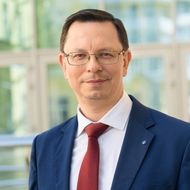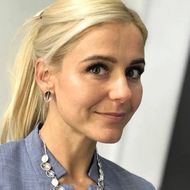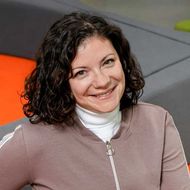HSE University-Developed Linguatest System Launched in Nizhny Novgorod
Linguatest, Russia’s first foreign-language certification system, has been launched in the Nizhny Novgorod region. The system was developed by specialists from HSE University in cooperation with the National Accreditation Agency and the Prosveshchenie group of companies, who are providing certification and publishing support for the project. Nizhny Novgorod is the first city after Moscow to offer testing under the system.
HSE University Rector Nikita Anisimov explained that the launch of the Russian testing certification system is aimed at replacing foreign equivalents such as IELTS and TOEFL, which are currently unavailable to Russians. He highlighted the particular significance of the launch of the first regional testing centre. He noted that unlike foreign analogues, all the personal data of those who undergo testing will be stored in Russia. ‘We plan to develop the Linguatest system, increase the number of foreign languages, add a test for Russian as a foreign language, and expand this domestic system across the country and beyond,’ he said.
The first testing session under the Linguatest system took place in Moscow at the end of 2022. Four people will receive certificates based on the results. So far, sixteen people have signed up for the second testing session, which is planned to take place next week.
Lemka Izmaylova, Director of the National Accreditation Agency, said ‘We are very satisfied with the results of the first testing session. The participants demonstrated excellent results. We hope that the geographical scope of Linguatest will continue to expand.’
After taking the test, participants receive a certificate demonstrating their level of English proficiency. The certificate is printed on security-marked paper and includes the participant’s personal information, test results, and a unique ID number which is added to the National Accreditation Agency register. Certificates are valid indefinitely.
During the press conference, Ekaterina Kolesnikova, Head of the HSE University School of Foreign Languages, expressed her hope that Linguatest certificates will be recognised abroad. ‘The creation of Linguatest was based on the best domestic practices for teaching foreign languages, with consideration of the fact that in the last several years, all international exams have been aligned with each other,’ she noted. ‘We developed a re-creditation scale, and the reverse side of the Linguatest certificate outlines all of the competencies demonstrated by the candidate at their level. Therefore, we hope that Linguatest will be recognised by our partners overseas.’
Prosveshchenie group President Mikhail Kozhevnikov stressed that the launch of the system is aimed at giving Russian citizens access to a high-quality certified domestic English-language exam in light of the growing demand for English proficiency in the labour market.
Andrey Sanosyan, Deputy Governor of the Nizhny Novgorod Region, was also in attendance. ‘The region’s businesses actively operate in foreign markets,’ he said. ‘As such, demand for this kind of knowledge certification remains high. I believe it is significant that Nizhny Novgorod is the first city after Moscow in which it is possible to obtain a certificate.’
The availability of the Linguatest system could become another point of attraction for the region, as demand for such services remains high and businesses will gain access to new and objective tools for assessing the language proficiency of employees.
‘Linguatest expands the potential for educational tourism in the region,’ said Anna Blyakhman, Director of HSE University-Nizhny Novgorod. ‘Nizhny Novgorod is an educational centre, and it is very valuable that people interested in taking the test can come here from all over the country.’
See also:
'The Applied Linguistics Programme Allowed Me to Try Something I Was Interested in While Continuing What I Am Passionate About'
Austin Garrett-Sites, from the US, is a master's student of the Applied Linguistics and Text Analytics programme in Nizhny Novgorod. Students from around the world to come to Russia to get a European education in English with viable employment prospects. Austin spoke about his impressions after the first year of study and his favourite places in Nizhny Novgorod.
What’s It Like to Work as a Computer Linguist
The IT industry is rapidly developing and incorporating new professions. Zoya Mazunina and Arina Mosyagina, linguists with Seldon and graduates of the HSE University Fundamental and Applied Linguistics programme, met with university applicants to talk about the computer linguist profession, issues of automatic language processing, and how linguists use the knowledge they gain at HSE University.
Towards Finding Practical Solutions to Socially Significant Healthcare Problems
The Centre for Language and Brain in Nizhny Novgorod started operations in September 2020. Today, it is comprised of a team of linguists - teachers and students - who are researching the relations between speech and parts of the brain. The Director of the Centre, Natalya E. Gronskaya, spoke to the HSE Look about how the neuro-linguistic laboratory appeared in Nizhny Novgorod, as well as current tasks and prospects the Centre can offer the students and the region.
Predicting Grammatical Properties of Words Helps Us Read Faster
Psycholinguists from the HSE Centre for Language and Brain found that when reading, people are not only able to predict specific words, but also words’ grammatical properties, which helps them to read faster. Researchers have also discovered that predictability of words and grammatical features can be successfully modelled with the use of neural networks. The study was published in the journal PLOS ONE.
Weaving Languages Together: Why Megacities Need to Preserve Multilingualism
Moscow, like any modern big city, attracts migrants from different regions and countries. Some of them speak very little or no Russian. Their adaptation and successful integration depend in part on how fast they can learn Russian and in part on whether the city makes an effort to accommodate other languages. According to linguist Mira Bergelson, this latter factor is particularly important if the city is to benefit from immigration.
‘Reading’ with Aphasia Is Easier than ‘Running’
Neurolinguists from HSE University have confirmed experimentally that for people with aphasia, it is easier to retrieve verbs describing situations with several participants (such as ‘someone is doing something’), although such verbs give rise to more grammar difficulties. The results of the study have been published in Aphasiology.
‘We Have Not Yet Fully Understood How Languages Work, and We Are Already Losing 90% of Their Diversity’
Why might a grandmother and her grandson not understand each other? Why would linguists want to go to Dagestan? Is it possible to save the less commonly spoken languages of small nations and Russian dialects? Nina Dobrushina, Head of the Linguistic Convergence Laboratory answered these questions in an interview with HSE News Service.
Former HSE Exchange Student Returns as Post-Doc in Linguistics
Originally from Pavia, Italy, Chiara Naccarato developed an interest in Russian early on in her studies, completing her undergraduate and master’s degrees in Russian Language and Linguistics at the University of Milan. She recently joined HSE as a postdoctoral researcher in the Linguistic Convergence Laboratory after completing her PhD studies in Linguistic Sciences at the Universities of Pavia and Bergamo.
Lecture Series Explores Communicative Supertypes, Russian as a Reality-Oriented Language, and Language & Culture
On March 19 and 22, Per Durst-Andersen, professor in the Department of Management, Society and Communication at Copenhagen Business School, gave three lectures at the Higher School of Economics on topics that fall under his current research interests, which focus largely on cognitive linguistics; communicative and linguistic typology; language, culture and identity; semiotics; and the philosophy of science. A well-known expert in cross-cultural pragmatics and specialist in business communication, Professor Durst-Andersen delivered the lectures as part of the ‘Language in the Universe of Culture: Russian Communicative Style’ course.
Francis Tyers – Drawn by Russia’s Linguistic Diversity
One of HSE’s newest faculty members is Francis Tyers, who will join the School of Linguistics on August 28 as an Assistant Professor. A native of Normanton on Soar, a small village in the south of Nottinghamshire in England, he joins HSE following a postdoctoral fellowship at UiT Norgga árktalaš universitehta in Tromsø in the north of Norway, where he worked on language technology for Russian and the Sámi languages. Prior to that, he completed PhD studies in the Department of Languages and Information Systems at the Universitat d'Alacant in Spain.





